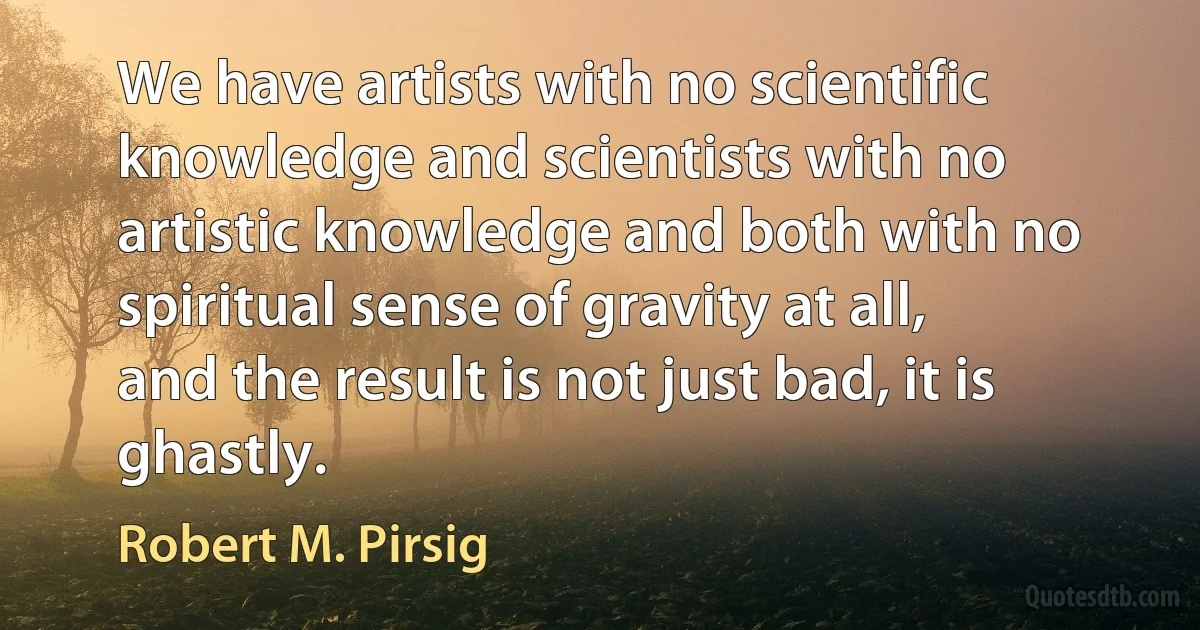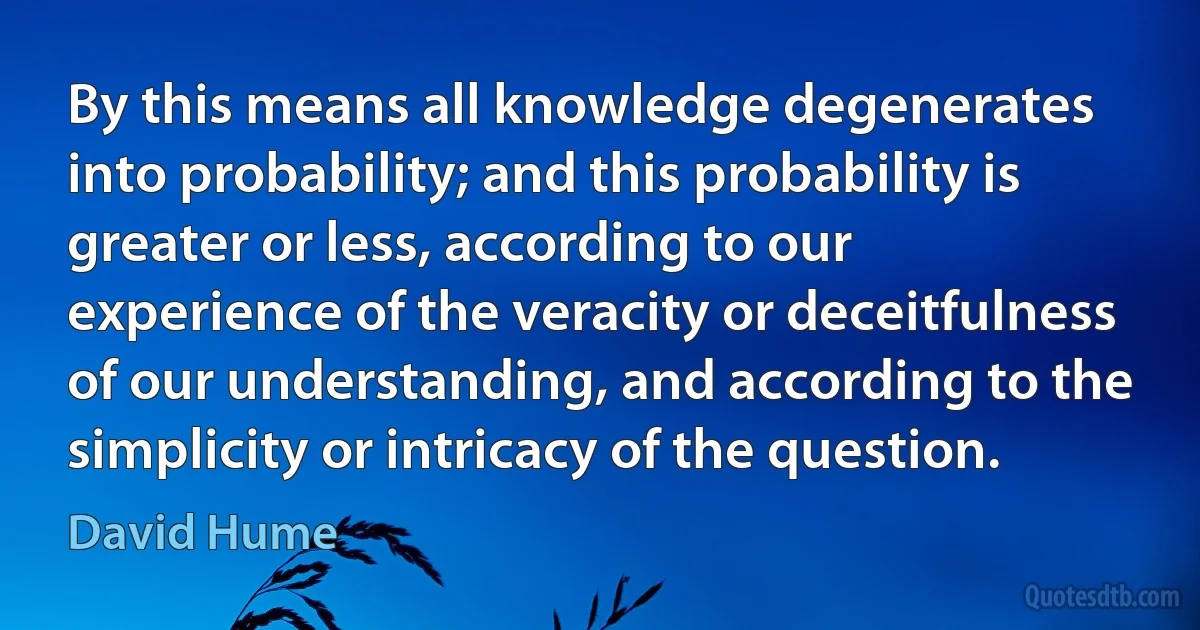Knowledge Quotes - page 93
What he had been talking about all the time as Quality was here the Tao, the great central generating force of all religions, Oriental and Occidental, past and present, all knowledge, everything.
Then his mind's eye looked up and caught his own image and realized where he was and what he was seeing and...I don't know what really happened...but the slippage that Phædrus had felt earlier, the internal parting of his mind, suddenly gathered momentum, as do the rocks at the top of a mountain. Before he could stop it, the sudden accumulated mass of awareness began to grow and grow into an avalanche of thought and awareness out of control; with each additional growth of the downward tearing mass loosening hundreds of times its volume, and then that mass uprooting hundreds of times its volume more, and then hundreds of times that; on and on, wider and broader, until there was nothing left to stand.
No more anything.
It all gave way from under him.

Robert M. Pirsig
Under Aristotle the "Reader," whose knowledge of Trojan aretê seems conspicuously absent, forms and substances dominate all. The Good is a relatively minor branch of knowledge called ethics; reason, logic, knowledge are his primary concerns. Aretê is dead and science, logic and the University as we know it today have been given their founding charter: to find and invent an endless proliferation of forms about the substantive elements of the world and call these forms knowledge, and transmit these forms to future generations. As "the system."

Robert M. Pirsig
The progress of human knowledge depends on maintaining that touch of scepticism even about the most "unquestionable" truths. A century ago, Darwin's theory of evolution by natural selection was regarded as scientifically unshakeable; today, most biologists have their reservations about it. Fifty years ago, Freud's sexual theory of neurosis was accepted by most psychiatrists; today, it is widely recognized that his methods were highly questionable. At the turn of this century, a scientist who questioned Newton's theory of gravity would have been regarded as insane; twenty years later, it had been supplanted by Einstein's theory, although, significantly, few people actually understood it. It seems perfectly conceivable that our descendants of the twenty-second century will wonder how any of us could have been stupid enough to have been taken in by Darwin, Freud or Einstein.

Colin Wilson
The purifying, healing influence of literature, the dissipating of passions by knowledge and the written word, literature as the path to understanding, forgiveness and love, the redeeming might of the word, the literary spirit as the noblest manifestation of the spirit of man, the writer as perfected type, as saint.

Thomas Mann
A man must read widely, a little of everything or whatever he can, but given the shortness of life and the verbosity of the world, not too much should be demanded of him. Let him begin with those titles no one should omit, commonly referred to as books for learning, as if not all books were for learning, and this list will vary according to the fount of knowledge one drinks from and the authority that monitors its flow.

José Saramago
The important thing with a child is that you love them, you protect them and you help them to grow and find out who they are. And as a parent, it's my responsibility to help them to become independent and get all the knowledge and a broad view of the world and life. I know that Nic [former wife Nicole Kidman] absolutely agrees with that. And that's what's important: being there.

Tom Cruise
Suffering, sad "female humanity!" What are these feelings which they are taught to consider as disgraceful, to deny to themselves? What form do the Chinese feet assume when denied their proper development? If the young girls of the "higher classes," who never commit a false step, whose justly earned reputations were never sullied even by the stain which the fruit of mere "knowledge of good and evil" leaves behind, were to speak, and say what are their thoughts employed upon, their thoughts, which alone are free, what would they say?

Florence Nightingale
Far transcend my weak invention.
'Tis a simple Christian child,
Missionary young and mild,
From her store of script'ral knowledge
(Bible-taught without a college)
Which by reading she could gather,
Teaches him to say Our Father
To the common Parent, who
Colour not respects nor hue.
White and Black in him have part,
Who looks not to the skin, but heart.

Charles Lamb
It is manifest that there is no danger at all in the proportion or quantity of knowledge, how large soever, lest it should make it swell or out-compass itself; no, but it is merely the quality of knowledge, which, be it in quantity more or less, if it be taken without the true corrective thereof, hath in it some nature of venom or malignity, and some effects of that venom, which is ventosity or swelling. This corrective spice, the mixture whereof maketh knowledge so sovereign, is charity, which the Apostle immediately addeth to the former clause; for so he saith, "Knowledge bloweth up, but charity buildeth up".

Francis Bacon



